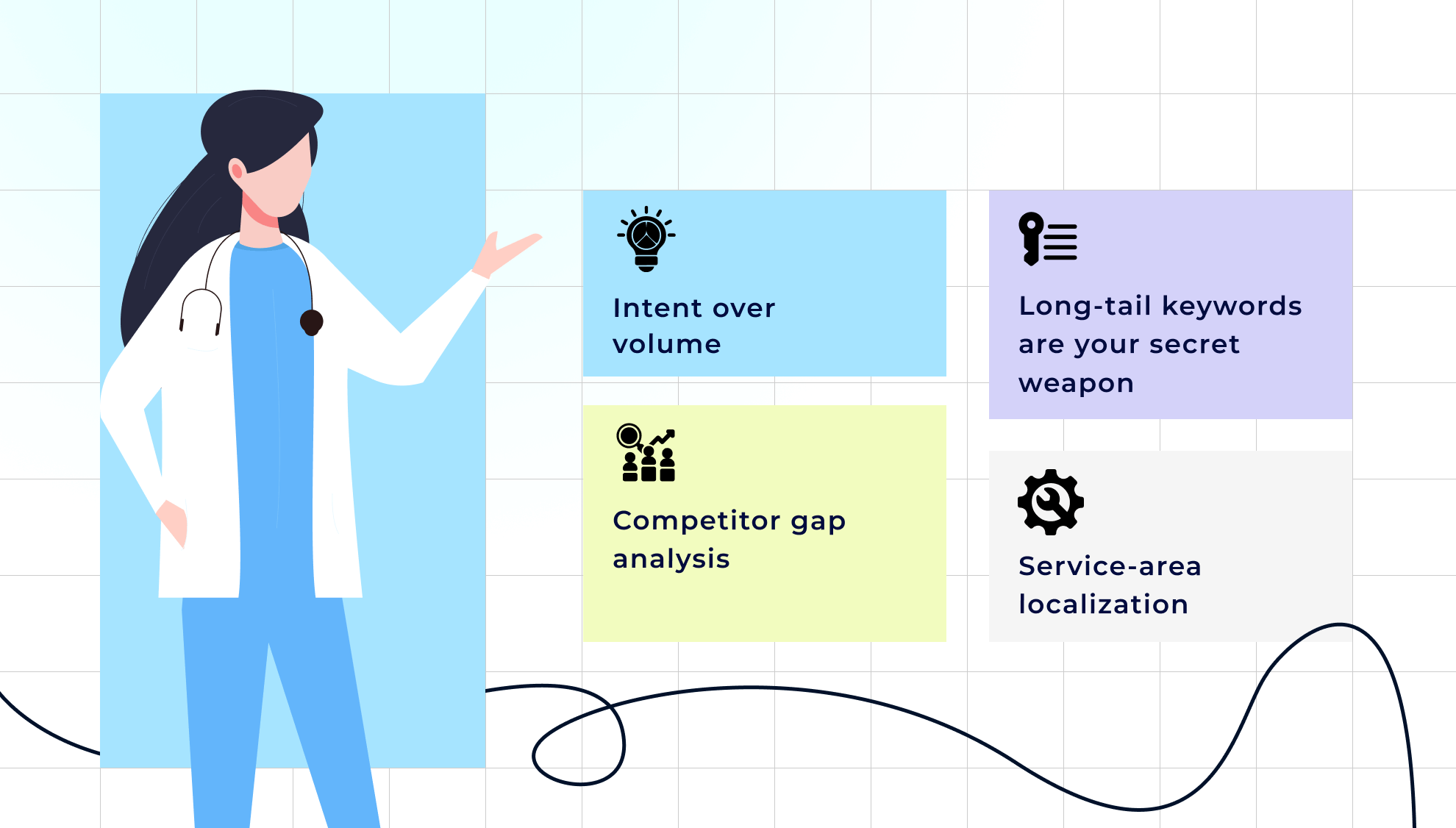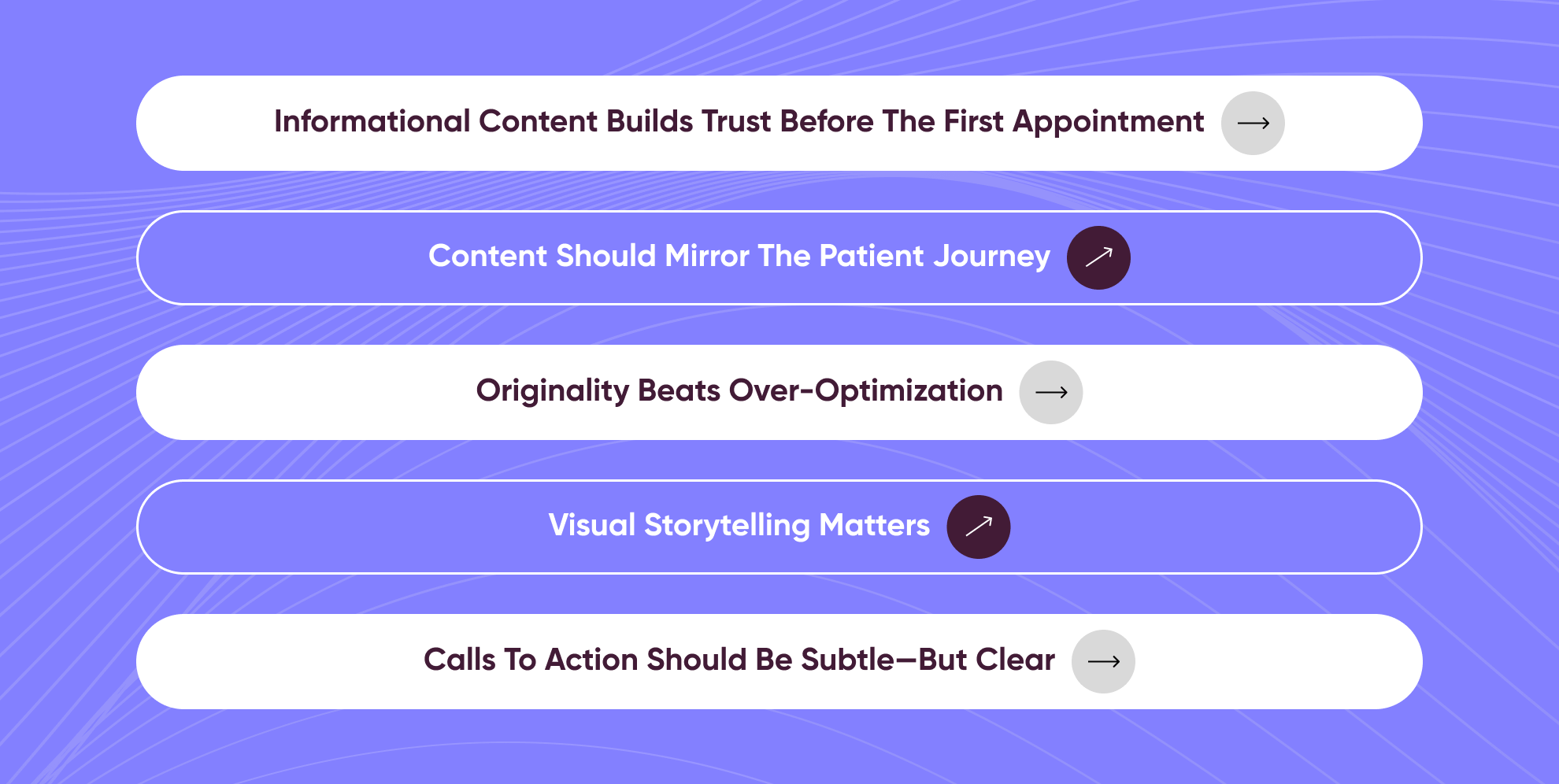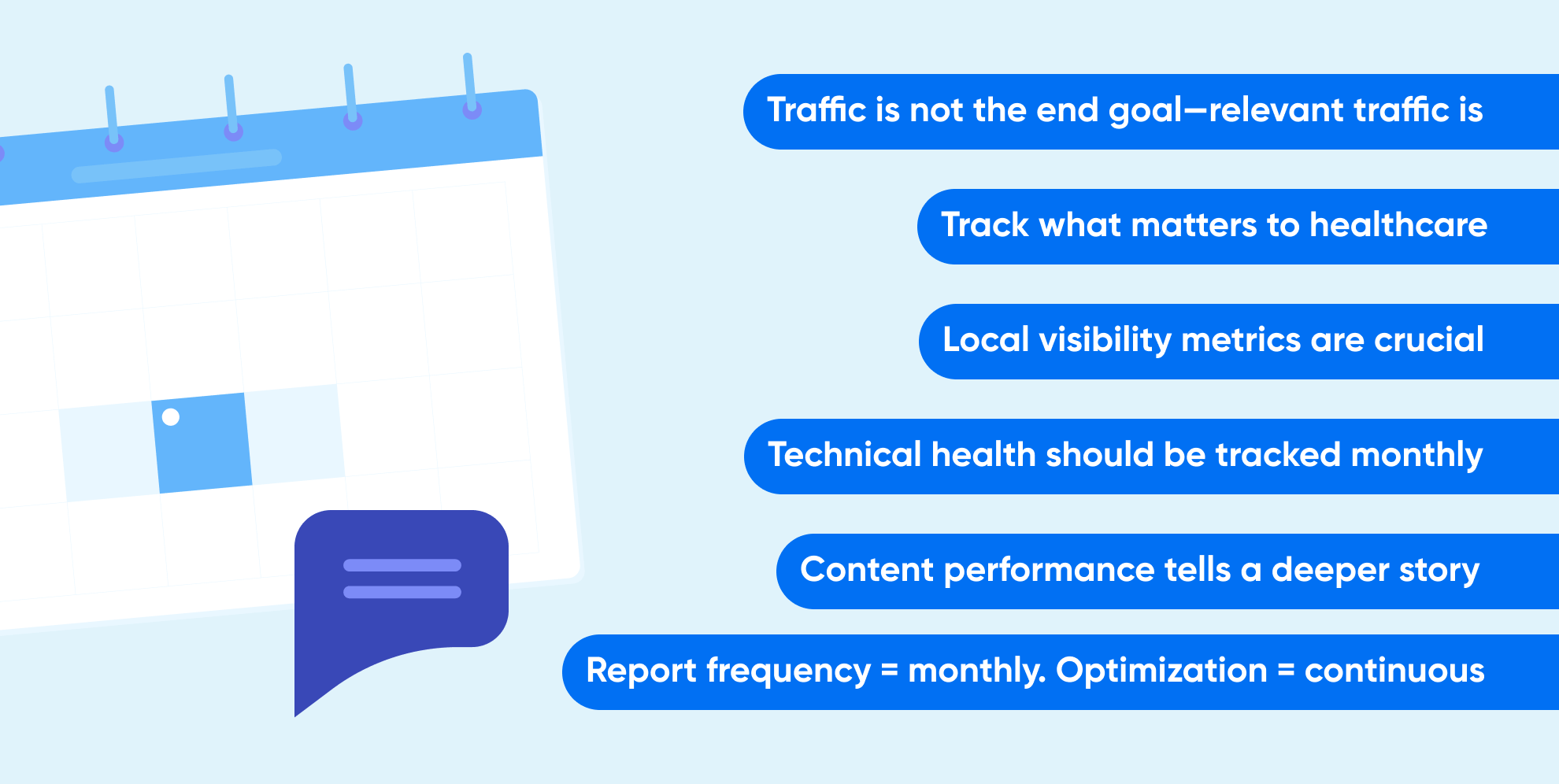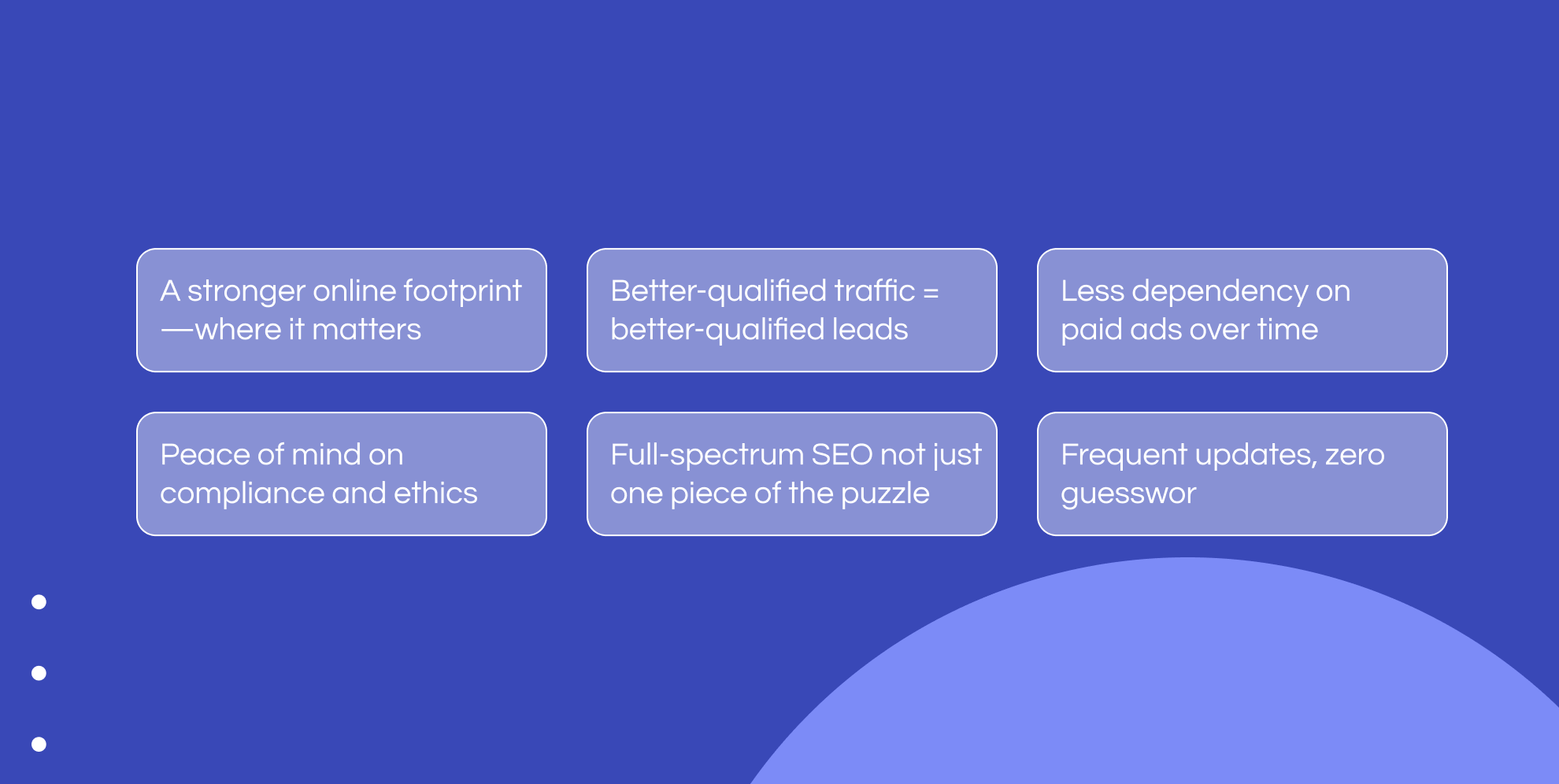Houston SEO for Medical Practices Is Your New Front Door

 21 min
21 min
In Houston, where world-class hospitals rise like monuments to modern medicine and private practices stretch across every suburb, something unusual is happening a shift not in how care is delivered, but in how it's found.
The battle for patients is no longer playing out in hospital lobbies or through word of mouth. It's happening on Google.
Behind every search for a “dermatologist near me” or “urgent care in Houston open now,” lies an invisible algorithm choosing winners and losers. For medical professionals, this algorithm isn’t just a digital curiosity it’s a gatekeeper to growth, trust, and in some cases, survival.
You can be the most skilled physician in Harris County, with spotless credentials and a wall full of accolades. But if your practice isn’t visible when a patient needs you most if your name doesn’t surface on that crucial first page of search results you may as well not exist.
This blog isn’t about marketing fluff or technical jargon. It’s about reality. The digital age has reshaped how people choose their healthcare providers and Houston SEO for medical practices is at the heart of that transformation.
The Houston Healthcare Market: A Competitive Battlefield
There’s no shortage of talent in Houston’s medical scene. The city is home to over 85 hospitals, 19,000+ licensed physicians, and the Texas Medical Center the largest in the world. But behind this reputation lies a quieter, more ruthless battlefield: the online search bar.
In this digital arena, every practice is a contender. From legacy institutions to new-age clinics opening inside renovated strip malls, the competition for online attention is relentless. A Google search doesn’t care how many lives you’ve saved or how loyal your patient base is. It ranks results based on digital authority, technical compliance, and keyword relevance not empathy, not expertise.
Many clinics, even the best-intentioned, fall into a dangerous trap: assuming that quality care alone will bring patients in. But today’s patient isn’t just looking for care they’re looking for convenience, visibility, and digital reassurance.
If your competitors have invested in SEO if they appear in Google’s coveted “local pack,” if they have glowing reviews optimized for search then they’re not just ahead of you. They’re miles ahead. In a city where healthcare choices are abundant, not showing up is equivalent to not showing up at all.
Is Your Practice Getting Found Online Today?
Struggling with low visibility despite great care? Discover how strategic SEO can connect your clinic with patients already searching for you.
Get a Free SEO Audit
Why SEO is a Game-Changer for Houston-Based Medical Practices
Let’s get one thing straight: SEO isn’t about gaming the system. It’s about playing by the new rules of trust.
The digital age has redefined how patients behave. They don’t call. They Google. They don’t browse dozens of websites they click the top two or three search results. And they often make a decision without speaking to a soul.
Here’s what this means for you:
- SEO replaces the receptionist as your first point of contact: Before a potential patient hears your voice, they’re judging your practice by your online presence your reviews, your rankings, even the speed of your website.
- It levels the playing field: A solo practitioner with strong SEO can outrank a hospital group with a sluggish web presence. In the eyes of Google, consistency, content, and relevance matter more than square footage or legacy.
- It builds digital authority: Appearing high in search results isn’t just a convenience it’s a trust signal. Patients subconsciously assume that if Google ranks you first, you must be credible.
- It brings long-term value: Unlike paid ads, which stop the moment your budget runs dry, organic SEO builds over time. It's the digital equivalent of compound interest.
- It targets intention: Traditional marketing casts a wide net. SEO hits patients when they're actively looking for care when their need is urgent and their intent is real.
In short, Houston SEO for medical practices isn’t just about visibility. It’s about relevance, reputation, and reaching patients when they need you most not a second too late.
Strategic Keyword Research for Medical SEO

Let’s bust a myth right now: SEO isn’t just about stuffing words into pages and hoping Google rewards you. Not even close. At the heart of every successful SEO strategy lies strategic keyword research the unsung blueprint that separates a practice that gets clicks from one that’s buried under digital dust.
When we talk about Houston SEO for medical practices, keyword research takes on a hyper-specific flavor. Why? Because medical search behavior is deeply personal, urgent, and often localized. People aren’t just searching “doctor in Houston.” They’re typing in phrases like:
- “Best endocrinologist in Sugar Land open Saturday”
- “Walk-in urgent care Houston with Cigna”
- “OB-GYN for high-risk pregnancy West Houston”
If you’re not tailoring your content to match these real-life searches, you’re not aligning with patient intent and you’re definitely not ranking.
Here’s what strategic keyword research actually involves:
Intent over volume
A keyword that 200 people search per month, but with high conversion intent (e.g., “pediatric asthma specialist Houston”) is often more valuable than a vague term with thousands of monthly searches (e.g., “children’s doctor”).
Long-tail keywords are your secret weapon
These are more conversational, more specific, and most importantly more likely to convert. Think “affordable dental implants Houston Heights” vs. “dentist Houston.”
Competitor gap analysis
What are your competitors ranking for that you’re not? That’s not just lost traffic it’s lost business. Tools like SEMrush and Ahrefs can help map that terrain.
Service-area localization
Houston is massive. So, your keywords shouldn’t just reflect your specialty they should reflect where your patients are searching from. River Oaks. Katy. The Woodlands. Be specific.
Effective keyword research is investigative journalism meets market strategy. It’s the ground-level work that tells the rest of your content where to go, how to behave, and who it needs to speak to.
Technical SEO Essentials for Medical Websites
Now, let’s talk about the side of SEO that rarely gets love technical SEO. It's the digital plumbing of your website. Invisible to patients, but critical to their experience and to whether they ever find you in the first place.
If keyword strategy is the message, technical SEO is the microphone. Without it, your content might as well be whispering into the void.
So what exactly does technical SEO mean for a medical website? Here’s the breakdown:
Site speed matters more than ever
Google expects your site to load in under 3 seconds. But it’s not just Google so do patients. A sluggish website, especially on mobile, is a fast track to abandonment. Every second lost is a potential patient lost.
Mobile-first isn’t optional
Over 60% of health-related searches come from mobile devices. If your website isn’t optimized for mobile responsive design, tappable menus, easy-to-read fonts you’re effectively turning away the majority of your audience.
Security and HIPAA-compliance
A healthcare site must be HTTPS-secured. Patients are sharing sensitive information. Your site needs to reflect trust, and security isn’t just a Google ranking factor it’s a moral obligation.
Clean URL structures and crawlable architecture
Your pages need to be organized in a way that makes sense to humans and search bots. Think: “/services/dermatology-houston” instead of “/page?id=472”. Every unnecessary redirect or broken link is a leak in your ranking potential.
Schema markup for healthcare
This is like metadata on steroids. Schema tells search engines exactly what kind of content is on your page doctor profiles, specialties, reviews, operating hours so it can display rich results (like stars, locations, call buttons) directly in search listings.
No duplicate content
This one’s sneaky. Many healthcare networks copy-paste provider bios or service descriptions across multiple pages. Google penalizes that. Each page must be uniquely valuable.
In short, your site shouldn’t just look pretty it should perform like a well-oiled machine. Houston SEO for medical practices only works when every technical element is aligned to serve the user and support your visibility.
Ready to Reach More Local Patients?
Your next appointment might start with a search. See how your website performs and what can be done to boost patient engagement.
Claim My SEO Assessment
Local SEO and Reputation Management
You may be an outstanding physician. But when someone searches “ENT near me” on Google Maps, that fact alone won’t save you. What will? Local SEO the art of being exactly where your patients are searching and reputation management the art of showing them why they should trust you.
Let’s dissect this.
Local SEO is driven by the holy trinity of:
Google Business Profile (GBP) optimization
If you don’t have this set up correctly with accurate categories, location, services, business hours, and contact info you’re throwing away your #1 local discovery tool.
NAP consistency (Name, Address, Phone)
Your contact details must be identical across all directories Yelp, WebMD, Healthgrades, Facebook, etc. Inconsistencies create confusion and lower your trust score with Google.
Citations and map signals
Local directories, healthcare listings, and location-based backlinks validate your legitimacy. They tell Google: “This business is real, local, and active.”
But local visibility is only half the battle. The other half? Trust.
That’s where reputation management comes in.
- Reviews = digital word-of-mouth: 72% of patients say online reviews are their first step in finding a doctor. A few negative reviews? Not a dealbreaker. But no reviews at all? That’s a red flag.
- Respond to feedback: Reply to every review good, bad, or neutral. It shows engagement, accountability, and transparency. Silence breeds suspicion.
- Review generation strategies: Make it easy and ethical for patients to leave feedback. A well-timed post-visit email or SMS reminder goes a long way.
When combined, local SEO services and reputation management make you not just visible, but credible and trustworthy in your community. That’s the edge. In a city like Houston where patients have no shortage of options visibility alone won’t win. Authority and authenticity will.
Content Marketing That Converts

Let’s not romanticize it: content without purpose is noise. And in healthcare, noise gets tuned out fast.
Here’s the thing most medical websites are filled with the same recycled phrases: “compassionate care,” “state-of-the-art facility,” “committed to excellence.” It’s well-intentioned, but meaningless in today’s digital landscape. Patients are looking for answers, not adjectives. And
Houston SEO for medical practices only works when your content serves the real questions people are already typing into search bars.
So how do you create content that converts? You meet people where they are then you guide them to where they need to go.
Informational content builds trust before the first appointment
A blog titled “What to Expect During Your First Physical Therapy Session” does more for patient conversion than any homepage slogan ever could. Why? Because it answers a real question with real empathy. The patient feels heard. Seen. Understood.
Content should mirror the patient journey
Think of your content as a conversation. First, the patient is just browsing (awareness). Then they start comparing options (consideration). Finally, they’re ready to book (conversion). Each stage demands different messaging. A case study, a FAQ page, and a pricing breakdown might all serve different points of the journey but together, they move the reader forward.
Originality beats over-optimization
Don’t fall into the trap of overloading your site with robotic, keyword-dense articles that read like they were written by a toaster. Write like a human. Explain complex conditions simply. Tell stories. Use real examples. This isn’t just good practice it’s what Google rewards.
Visual storytelling matters
Infographics, explainer videos, before-and-after case highlights these aren’t fluff. They’re digestible, shareable proof points. In a visual-first internet, your images speak just as loudly as your text.
Calls to Action should be subtle but clear
“Schedule your consultation today” works better when it’s nestled into the flow of helpful content. Push too hard, and you sound like a billboard. Offer value first, then guide gently.
Most importantly, content that converts doesn’t shout it teaches, clarifies, and encourages. When done well, it does what no paid ad can: it earns trust. That’s the currency that Houston SEO for medical practices is truly trading in.
Curious If SEO Is Worth the Investment?
We’ll show you what Houston patients are really searching for and whether your site is showing up where it should.
Request a Free Consultation
AI in SEO: The Future Is Now
Let’s clear the air AI in SEO isn’t a futuristic luxury. It’s already here, baked into every aspect of search engine behavior and strategy. If your healthcare SEO plan doesn’t acknowledge that, it’s running on outdated fuel.
For medical practices in Houston, embracing AI isn’t about replacing human insight. It’s about augmenting it with speed, precision, and the kind of pattern recognition no team of interns could achieve.
Here’s how AI is reshaping SEO as we know it:
Search intent is no longer static
Google’s algorithm powered heavily by AI is now smart enough to understand context. A search for “chest pain” at 2 a.m. on a mobile device in Houston is interpreted differently than that same search at noon from a desktop in New York. AI helps SEO experts align content with this contextual understanding, fine-tuning relevance.
AI tools help identify ranking opportunities faster
Platforms like Clearscope, SurferSEO, and MarketMuse use natural language processing to analyze what content is already ranking and more importantly, what gaps your content can fill. It’s SEO strategy at hyperspeed.
Voice search is powered by AI and it’s growing fast
“Hey Siri, find a dermatologist near me open today.” These aren’t web searches anymore they’re spoken queries. AI-driven SEO understands this shift. That means optimizing for conversational keywords, FAQ-style content, and natural phrasing.
Predictive analytics guides smarter strategy
AI can anticipate shifts in search trends before they explode. For healthcare providers, that means preemptively creating content around seasonal illnesses, emerging treatments, or even public health concerns specific to Houston.
AI doesn’t replace human expertise it amplifies it
No tool can replace your experience as a practitioner, or our ability to understand nuance. But AI can process vast volumes of data faster than any human ever could. It flags patterns, opportunities, and blind spots so you can make sharper decisions.
Still skeptical? Here’s the truth: if your competitors are leveraging AI and you’re not, you’re not just behind you’re playing a different game altogether. Houston SEO for medical practices is evolving rapidly, and artificial intelligence is not the future it’s the standard.
Reporting, KPIs & Ongoing Optimization

If you’re investing in SEO and you’re not getting clear, consistent reporting you’re flying blind. And in healthcare marketing, where every click can translate into real patient outcomes, blind isn’t good enough.
SEO isn’t a “set it and forget it” strategy. It’s a living, breathing system that requires monitoring, adjustment, and intelligent interpretation. That’s why reporting and KPIs aren’t just formalities they’re the pulse check of your entire strategy.
Here’s what a reliable SEO report should tell you (without making your head spin):
Traffic is not the end goal relevant traffic is
A sudden spike in website visits may feel good. But if those users bounce after 5 seconds, it means they didn’t find what they needed. The real win? Lower bounce rates, higher time on page, and increased conversion paths.
Track what matters to healthcare
Don’t get lost in vanity metrics. Focus on KPIs like:
- Organic traffic by service type (e.g., orthopedic vs. dermatology)
- Click-through rates on appointment forms
- Page rankings for high-intent keywords (like “best cardiologist Houston Midtown”)
- Conversion sources (what page or blog led to that appointment?)
Local visibility metrics are crucial
Monitor how your practice ranks in local search packs, map listings, and mobile queries. These rankings shift constantly especially in a city as competitive as Houston.
Technical health should be tracked monthly
Core Web Vitals, crawl errors, broken links these can quietly sabotage your rankings. Technical audits should be regular, not reactive.
Content performance tells a deeper story
Which blog posts are attracting visitors? Which are converting them? This data helps you decide what to write next and what to quietly sunset.
Report frequency = monthly. Optimization = continuous
SEO reports should land in your inbox once a month. But optimization? That’s a weekly task. Algorithms update, competitors adapt, trends shift. SEO that doesn’t evolve becomes obsolete fast.
The goal of reporting isn’t to dazzle with numbers. It’s to uncover the truth. And that truth should drive better decisions, sharper strategy, and most importantly real business outcomes.
Because at the end of the day, Houston SEO for medical practices isn’t about ranking for the sake of it. It’s about connecting you to the right patients, at the right time, with the right message.
Need Help Navigating Medical SEO in Houston?
Our team knows healthcare, knows Houston, and knows what works. Fill out the form and let’s start a smarter strategy.
Request a Free Consultation
Why Choose Edifying Voyages for Medical SEO in Houston?
Let’s face it when it comes to SEO, there’s no shortage of agencies promising top rankings, increased traffic, and marketing jargon that sounds good on paper but doesn’t always show up in your bottom line. So why should a medical practice in Houston entrust Edifying Voyages with its SEO strategy?
Here’s the truth: we don’t sell fluff. We build frameworks. SEO for medical practices is not a creative guessing game it’s a science rooted in real-time data, human behavior, and an understanding of how the healthcare decision journey actually works.
What sets us apart?
We specialize in healthcare and we’re good at it
Medical SEO is a league of its own. The stakes are higher, compliance is tighter, and trust is everything. We’ve worked with specialists, multi-location clinics, private practices, and urgent care facilities. We know the nuances and we don’t need a learning curve.
We’re Houston-savvy
You don’t just need SEO. You need Houston SEO for medical practices which means knowing that patients in Katy behave differently than those in Midtown. Our localized strategies aren’t recycled from other industries; they’re built for this market, with geo-specific research and optimization down to the zip code.
We blend tech with empathy
SEO is technical, yes. But your audience is human. Our strategies are rooted in analytics but our content speaks like a real conversation with your future patients. This balance is what Google rewards and what your patients trust.
We’re transparent, always
You’ll never hear vague updates like “We’re working on it.” Our reporting is clear, visual, and directly tied to KPIs that matter. We show you what’s working, what needs adjusting, and what we’re doing next. No smoke, no mirrors.
We don’t do one-size-fits-all
Whether you’re a solo practitioner, a multi-specialty clinic, or a growing healthcare group we create SEO strategies tailored to your practice, your patients, and your future plans. Scalability is built in from day one.
If you’re looking for an agency that understands both medicine and marketing, who’s not afraid to get into the digital weeds while keeping their eye on the patient journey Edifying Voyages is your partner, not your vendor.
Benefits of Partnering with Edifying Voyages

Let’s talk about what actually changes when you work with us beyond rankings, beyond keywords. What does a real partnership with Edifying Voyages deliver to a Houston-based medical practice?
A stronger online footprint where it matters
Your Google Business Profile will no longer be an afterthought. Your reviews? Actively managed and amplified. Your local map presence? Optimized, monitored, and refined month after month. We make your practice more findable and more trustworthy in the moments that matter most.
Better-qualified traffic = better-qualified leads
Anyone can get you traffic. But we get you the right traffic patients who are actually looking for your services, in your area, right now. That means fewer bounces, more appointments, and a smoother path from search to scheduling.
Less dependency on paid ads over time
Ads are expensive. And once you stop paying, they disappear. Our SEO efforts compound over time. You build digital equity. You build organic credibility. And eventually, you reduce your reliance on paid search without sacrificing visibility.
Peace of mind on compliance and ethics
We understand the regulatory landscape. We don’t push black-hat tactics or risky shortcuts. We know how to build content and links that reflect medical accuracy, HIPAA-sensitivity, and Google’s E-E-A-T standards (Experience, Expertise, Authoritativeness, and Trustworthiness).
Full-spectrum SEO not just one piece of the puzzle
We cover it all: keyword strategy, technical SEO, local search optimization, mobile experience, content that converts, and transparent reporting. You’re not getting a slice. You’re getting the whole system interconnected and aligned to your goals.
Frequent updates, zero guesswork
Our clients hear from us biweekly with strategy updates, performance snapshots, and proactive recommendations. We don’t disappear once we get your business. The work begins after the contract is signed.
Ultimately, we don’t just help you rank we help you grow. And we do it with integrity, precision, and a deep respect for the patient experience.
Want Local Patients to Choose You First?
It starts with showing up when they search. Discover the key SEO gaps holding your clinic back from the top spots.
Book a Free SEO Briefing
Hiring Models Offered by Edifying Voyages
No two medical practices operate on the same growth curve so why should they be boxed into one-size-fits-all marketing retainers? At Edifying Voyages, we believe flexibility is a strength. That’s why we offer tailored hiring models to match where you are now and where you plan to go.
Here’s how we structure our offerings:
| Model | Best For | What’s Included | Engagement Style |
| Project-Based SEO | New website launches, location SEO upgrades, one-time audits |
|
One-time, milestone-driven |
| Monthly Retainer (Most Popular) |
Clinics needing long-term growth, consistency, and full-spectrum SEO |
|
Month-to-month, performance-based |
| Hourly-Based SEO | Clinics needing ad-hoc support, specific fixes, or flexible bandwidth |
|
Hourly blocks (10–40 hrs/week) |
| White-Label SEO for Agencies | Marketing or web design firms with medical clients |
|
Behind-the-scenes partnership |
| Customized Plans | Practices with non-traditional goals or multi-service offerings |
|
Needs-based, scalable framework |
Whatever level of involvement you need from full execution to strategic advisory we have a model that adapts to your bandwidth, budget, and business structure. And as your needs evolve, so can your model. No red tape. No rigid contracts.
Because in the world of Houston SEO for medical practices, adaptability isn’t just helpful it’s essential.
Conclusion
If there’s one undeniable truth in today’s healthcare landscape, it’s this: visibility equals viability. The best physicians, the most modern facilities, and the highest patient satisfaction scores mean little if patients can’t find you when it matters. And in Houston a city bursting at the seams with medical excellence the margin for invisibility is razor-thin.
Houston SEO for medical practices is not a trend. It’s not a marketing experiment. It’s the modern engine behind patient discovery, digital trust, and business growth. Whether you’re a neighborhood clinic or a multi-location specialty group, how and where you appear online directly impacts who walks through your doors.
What this blog has laid bare is simple:
SEO isn’t just about rankings. It’s about relationships. It’s about guiding a mother looking for urgent pediatric care at 2 a.m., or a father quietly researching cardiologists after a rough checkup. These aren’t clicks. They’re stories in motion and SEO is the bridge that brings them to you.
And while many practices are tempted by the lower costs of an offshore SEO agency, what they often sacrifice is healthcare context, local precision, and the ability to speak to the patient with cultural and geographic fluency. In a city as layered and localized as Houston, that trade-off can cost far more than it saves.
At Edifying Voyages, we don’t just know SEO. We know healthcare. We know Houston. And we know that when technology, trust, and timing align patients choose you.
So here’s the final word: if your practice is ready to be seen, to be trusted, and to grow you need more than a strategy. You need a partner who gets the entire ecosystem. And that’s exactly who we are.
FAQs
Medical SEO requires a more nuanced approach due to industry regulations, patient privacy laws, and the need to build trust before conversion. It’s not just about driving traffic; it’s about attracting the right patient with medically accurate, ethically sound content. A single misstep like overpromising or misrepresenting services—can lead to both reputational and legal risks.
Most medical practices start seeing meaningful traction between 3 to 6 months, though this depends heavily on their starting point, competition, and market saturation. SEO is a long-term investment that compounds over time it’s not a quick fix, but rather a strategic climb. Those who commit to the process often find themselves outpacing competitors who rely only on short-term ads.
Absolutely. Local SEO strategies can be tailored to target specific service areas, allowing each location to build its own digital footprint. This includes location-based landing pages, optimized Google Business Profiles, and locally relevant content. For sprawling cities like Houston, hyper-localization isn’t optional it’s essential.
Reviews aren’t just about reputation they directly impact how your practice ranks in local search results. Google uses review volume, frequency, and sentiment as key signals in its ranking algorithm. More importantly, prospective patients read them as a proxy for bedside manner and reliability often before visiting your site.
Yes because paid ads stop the moment you stop paying, but organic SEO continues to work in the background, building long-term authority and trust. A well-rounded digital strategy includes both, with SEO laying the groundwork for sustainability and reduced ad spend over time. Think of SEO as the foundation, and ads as the accelerant.
Ask if they have experience in the medical field and understand HIPAA-sensitive content. Review their reporting style, transparency on performance metrics, and how they handle local SEO and patient intent. Above all, avoid firms that promise overnight results good SEO is never instant, and real partners never hide behind jargon.





